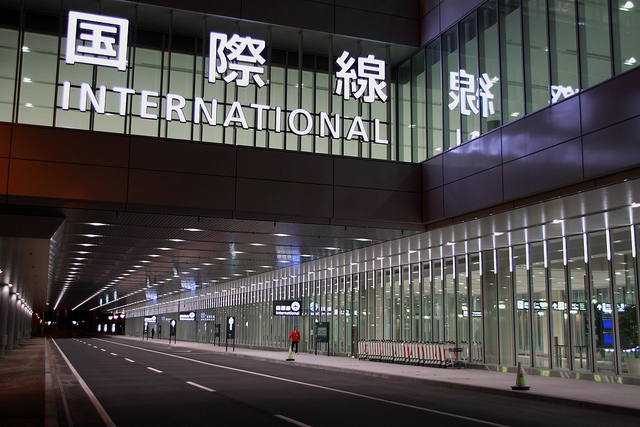NSA Leaker Edward Snowden’s Not in Russia. Technically.
In response to the American government’s increasingly agitated international temper tantrums over their lost IT guy, Russia has decided to push back, saying that they don’t have him. The fact that—as President Putin just confirmed—he’s been chilling in the airport lounge of Moscow’s Sheremetyevo airport? Totally beside the point, according to the Russians.
“Correspondents say Lavrov’s comments suggest that Mr Snowden remained air-side after landing at Moscow’s Sheremetyevo airport, and so has technically never entered Russian territory.
“We are in no way involved with either Mr Snowden, his relations with US justice, nor to his movements around the world,” Mr Lavrov said.
“He chose his itinerary on his own. We learnt about it… from the media. He has not crossed the Russian border.
“We consider the attempts to accuse the Russian side of violating US laws, and practically of involvement in a plot, to be absolutely groundless and unacceptable.””
Russia is claiming that because Snowden hasn’t gone through customs, he isn’t in Russia, so they have no control of the situation. While there’s not really any doubt that if Russia wanted to give Snowden to the U.S., it could, Russian authorities don’t have any incentive to search for the legal loopholes that would make it possible for them to arrest someone in transit.
Plus, Russia has a history of using the international area of the Sheremetyevo airport to wash their hands of sticky extradition messes. In 2006, Iranian activist Zahra Kamalfar and her two children were placed in the airport by Russian authorities during an interminably long wait for asylum status. The family spent 11 months at the airport, refusing to board flights back to Tehran.
International zones of airports are strange places. Most travelers experience them as the lounges and halls between airport security and their departure gate, or connecting flights. Filled mostly with duty free shops, the international zone is a technicality that usually doesn’t crop up, except in extreme cases, like that of Merhan Karimi Nasseri (who spent 18 years in Charles De Gaulle Airport in Paris.)
Europe has a strong tradition of international zones. With that many countries on a continent, connecting flights would be a disaster if passengers had to go through customs every time they needed to connect through Schiphol, De Gaulle or Frankfurt. Simply having a designated area where travelers within the EU could pass through without setting foot on Dutch, French, or German soil makes air travel more efficient, but also creates a grey area.
This was never more apparent than in the case of Edwin P. Wilson, a former CIA operative who was charged with shipping (literally) tons of explosives to Libya among other charges (including planning to murder his wife).
After years of being pursued by the United States government, Wilson was lured to the Dominican Republic, with United States marshals following his flight plan and tracing him through international zones of European airports. The Swiss government did not interfere with Wilson’s movement in the international zone, but the Dominican government eventually did, forcing him onto a U.S.-bound flight.
“In late May, Mr. Wilson indicated he was ready to move. Another Dominican visa was obtained, and plane reservations were made. On Sunday, June 13, Mr. Wilson flew from Libya to Zurich.
After his arrival in the early evening, he met with Mr. Keiser, a lawyer from Geneva and several other associates, never leaving the international zone of the Zurich airport.
The Swiss authorities, alerted about his travel plans by the United States, did not interfere with his movements. Several United States marshals shadowed Mr. Wilson on his 24-hour stopover at the airport.
On Monday evening, accompanied by Mr. Keiser, he flew to Madrid and changed planes for a nonstop flight to Santo Domingo, the Dominican capital. When Mr. Wilson and Mr. Keiser arrived before dawn on Tuesday, the Dominican authorities, also alerted by the United States, held Mr. Wilson in the international zone of the airport until minutes before a Dominicana Airlines nonstop flight for New York was scheduled to depart.
After advising Mr. Wilson that his passport was invalid, the authorities put him aboard the plane to New York. The marshals, who had traveled the same route from Zurich, arrested Mr. Wilson when the plane landed at Kennedy.”
The United States Justice Department later ruled that, even though the trip didn’t involve any sort of normal extradition process, it was still legal.
“The Justice Department officials observed that the Supreme Court had ruled that while a defendant must receive due process in the United States, the Court would not address the question of how the defendant came into the country.
The officials cited a 1952 case, Frisbie v. Collins, in which the Supreme Court reaffirmed an 1886 ruling that stated, ”The power of a court to try a person for a crime is not impaired by the fact that he had been brought within the court’s jurisdiction by reason of a ‘forceful abduction.’ ””
Wilson served 22 years of a 52-year sentence before proving that he had been working under the direction of the CIA when he sold the explosives to Libya. He was released in 2004 and died last year.
With all of the governments, activists, and basically the entire media world looking into his travel plans, Snowden isn’t likely to turn into the next Nasseri, or Kamalfar. Whether his tale ends like Wilson’s, trailed through the international terminals of the world, only to be arrested at an American airport, remains to be seen.
More From Smithsonian.com:
400 Words to Get Up to Speed on Edward Snowden, the NSA And Government Surveillance
Music for Airports Soothes the Savage Passenger
The Airport Design Utopian
